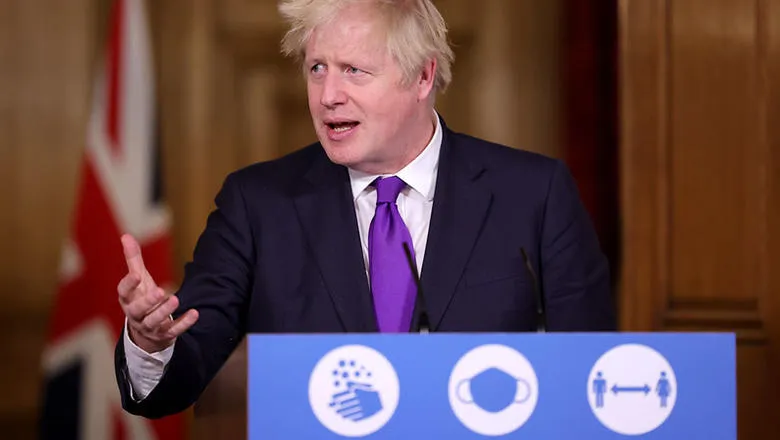06 December 2020
Majority of Britons distrust government Covid response for first time
The proportion who feel this way has doubled since the start of the crisis

The UK government’s handling of the coronavirus crisis: public perceptions
Read the research
57% of the public say they do not trust the UK government to control the spread of coronavirus – the first time in a series of studies running since April that distrust has become the majority view in the country.
The proportion who feel this way has doubled since the start of the crisis eight months ago, when 28% said they did not trust the government’s handling of the pandemic.
The finding comes from new research by King’s College London and Ipsos MORI, based on 2,244 interviews with UK residents aged 16-75, carried out online between 20 and 24 November.
Data from other trends reveals there has also been a significant increase in the proportion who believe that the response to Covid-19 has been confused and inconsistent. 68% now agree this is the case, up from 42% at the beginning of the crisis.
Similarly, 40% of people think the government’s plan for tackling the virus has adapted badly to the changing scientific information and situation – more than double the 15% who said the same in early April.
In line with these changes, the official coronavirus response currently inspires strong opinions in many:
- Half the population (51%) think the UK government’s handling of the coronavirus crisis has been a national humiliation – twice as many as those who disagree (26%).
- Half (50%) also say they’re angry with the government because of how it’s handled the crisis, compared with a quarter (25%) who do not feel this way.
The handling of certain aspects of the crisis may go further in explaining this sentiment:
- Nearly two-thirds (64%) think the UK government failed to prepare properly for a second wave of coronavirus infections.
- 47% think the government has prioritised some parts of the country over others in
its response to the crisis – more than double the 19% who think it hasn’t. - 45% think the government has done a bad job of protecting young people’s futures during the pandemic – almost twice as many as the 23% who think it has done a good job.
- 46% think the government has done a bad job of protecting elderly or vulnerable people’s health during the crisis, compared with 28% who say the opposite.
However, despite these negative views, more people still say they support (44%) than oppose (25%) the UK government’s current approach to controlling coronavirus – and these numbers are virtually unchanged since July, when this question was last asked by the researchers.
Professor Bobby Duffy, director of the Policy Institute at King’s College London, said:
“Trust in authority is key to maintaining compliance with the unprecedented restrictions that the public are being asked to live with and building a sense of collective responsibility. The UK government began this crisis with seven in 10 people saying they trusted its handling of the pandemic – but it has haemorrhaged public confidence ever since. Now, for the first time, a majority say they distrust its management of the crisis.
“Some of the reasons for this shift are clear – around two-thirds think the government failed to prepare properly for a second wave of coronavirus infections and the same proportion think its approach has been confused and inconsistent.
“These perceived failings have provoked strong feelings in many people, with half of the public saying they think the handling of the pandemic has been a national humiliation, and the same proportion saying they’re angry with the government because of its response.
“However, despite all the negative and declining ratings, nearly half the public say they support the government’s approach, almost twice the proportion that oppose it, and virtually unchanged from July. So while perceptions of the government are declining, support for the actual measures are not – which reflects the incredible ongoing commitment among the majority of the public to controlling the spread of the virus.”
Kelly Beaver, managing director of public affairs at Ipsos MORI, said:
“These results will make for less than happy reading in government, with signs in particular that people are finding the changing advice in response to the evolving situation confusing. But there are silver linings for the government, too. While we do now see a majority not trusting the UK government to control the spread of Covid-19, we also see that almost double the number of Britons still support its current approach to dealing with the pandemic than don’t. Additionally, from Ipsos’s wider research we know that the drop in overall approval ratings for the UK government are in line with other governments around the world as the pandemic reaches the end of 2020.
“We’re also a long way from the ‘rally round the flag’ effect we saw early on in the crisis, with partisanship being an important indicator of an individual’s beliefs about it has been managed – around seven in 10 Labour supporters feel angry at the government because of its handling of the crisis, compared with only three in 10 Conservative supporters. After nine months of this pandemic, politics as usual is well and truly back to normal.”
Technical details
Ipsos MORI interviewed a sample of 2,244 adults aged 16-75 in the United Kingdom using its online i:omnibus between 20 and 24 November 2020. Data has been weighted to the known offline population proportions for age within gender, government office region, working status, social grade and education. All polls are subject to a wide range of potential sources of error.
